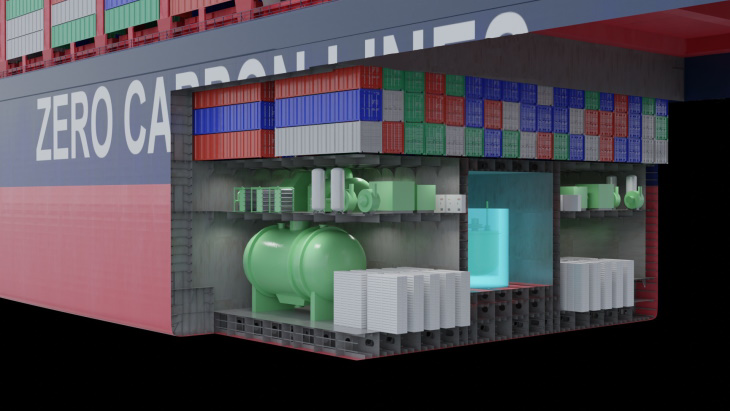
A study commissioned by the American Bureau of Shipping (ABS) has explored the potential of advanced nuclear reactor technology for commercial marine propulsion, whilst a study led by UK-based innovative reactor developer Newcleo will consider the feasibility of nuclear applications to the shipping industry, including the firm's small modular lead-cooled fast reactor technology.
ABS commissioned Herbert Engineering Corporation (HEC) to carry out a study designed to help the shipping industry better understand the feasibility and safety implications of nuclear propulsion and to support future development projects.
The study - which involved input from "leading nuclear reactor developers" - modeled the impact of nuclear propulsion on the design, operation and emissions of a container vessel and a Suezmax tanker.
According to the study, the use of two, lead-cooled, 30 MW fast reactors on the container carrier would likely increase cargo capacity and operational speed, while eliminating the need for refueling during its entire 25-year lifespan. On the Suezmax tanker, the study found the addition of four, 5 MW, heat-pipe microreactors, while decreasing cargo capacity, would raise operational speeds and only require refueling once during its 25-year life. Both concept vessels would emit zero CO2.
"Our findings from this latest cutting-edge research underscore why the industry cannot afford to ignore the vast potential offered by nuclear propulsion both in terms of emissions reduction and operational efficiency," said ABS Chairman and CEO Christopher Wiernicki. "A net-zero world is more easily realised through nuclear propulsion, and we are putting in place the foundations for that future today. Turning this into a practical reality will require significant public sector support and ABS is well placed to bring governments and industry together.
"Advanced or small modular reactors address many of the issues traditionally associated with nuclear for commercial maritime use, with enhanced safety and efficiency, reduced cost and waste and proliferation prevention. Nevertheless, many questions need to be answered and it is critical that industry evaluate these technologies with a laser focus on safety."
HEC Senior Principal Naval Architect Robert Tagg added: "This study is helping us to understand in detail both the potential of modern reactor technology and how this will affect the design and operation of future vessels."
The US Department of Energy (DOE) has awarded ABS a contract to research barriers to the adoption of advanced nuclear propulsion on commercial vessels. The DOE has also contracted ABS to support research into thermal-electric integration of a nuclear propulsion system on a commercial vessel being carried out by the University of Texas.
Meanwhile, Newcleo has signed an agreement with Fincantieri - one of the largest shipbuilding companies in the world - and RINA - the inspection, certification, ship classification and consulting engineering multinational - to carry out together a feasibility study for nuclear applications to the shipping industry.
Newcleo noted the deployment of its lead-cooled fast reactor (LFR) for naval propulsion would involve placing a closed mini reactor on vessels as a small nuclear battery producing 30 MWe. This, it said, would require infrequent refuelling (only once every 10-15 years), very limited maintenance and easy replacement at end of life.
The shipping industry, via the International Maritime Organization (IMO), approved last week new targets for greenhouse gas emission reductions, aiming to reach net-zero emissions by or around 2050.
"Fincantieri and RINA are two global leaders in the shipping sector, and combining their expertise with our technology innovation can bring a real solution to the issue of carbon emissions in maritime transport," said Newcleo Chairman and CEO Stefano Buono. "I look forward to the results of the feasibility study and the next steps of the project."
Fincantieri CEO and General Manager Pierroberto Folgiero added: "The agreement allows us to explore the possibility of adding a new and visionary solution among those at our disposal to achieve the ambitious decarbonisation goals the industry has set for itself. Nuclear power holds enormous potential and, as such, it needs the best expertise to be expressed, and we are proud to join with partners like Newcleo and Rina to help get this done."
"The improvement of fuel efficiency and vessel design is already giving good results in reducing shipping footprint," said Ugo Salerno, Chairman and CEO of RINA. "But, in order to reach the targets fixed for this industry, we need alternative fuels with low carbon content from well to waste. Nuclear will be one of the answers to these objectives. In addition, small modular reactors will be the most efficient solution to apply nuclear to shipping."
 A study commissioned by the American Bureau of Shipping (ABS) has explored the potential of advanced nuclear reactor technology for commercial marine propulsion, whilst a study led by UK-based innovative reactor developer Newcleo will consider the feasibility of nuclear applications to the shipping industry, including the firm's small modular lead-cooled fast reactor technology.
A study commissioned by the American Bureau of Shipping (ABS) has explored the potential of advanced nuclear reactor technology for commercial marine propulsion, whilst a study led by UK-based innovative reactor developer Newcleo will consider the feasibility of nuclear applications to the shipping industry, including the firm's small modular lead-cooled fast reactor technology.